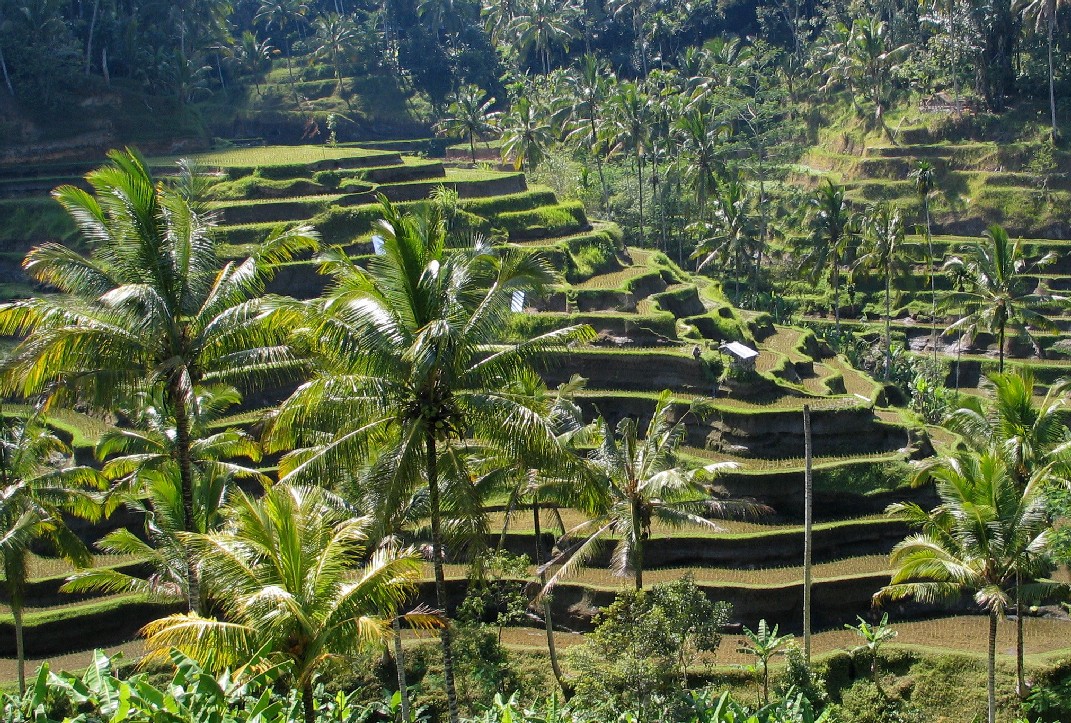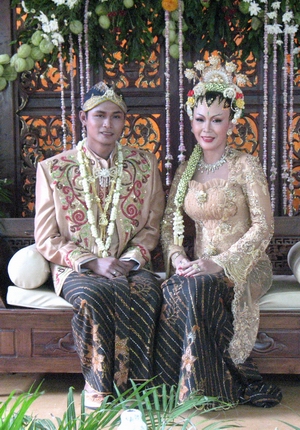|
Kertanegara Of Singhasari
Sri Maharajadiraja Sri Kertanagara Wikrama Dharmatunggadewa, Kritanagara, or Sivabuddha (died 1292), was the last and most important ruler of the Singhasari kingdom of Java, reigning from 1268 to 1292. Under his rule Javanese trade and power developed considerably, reaching the far corners of the Indonesian archipelago. Background Kertanagara was the fifth ruler of Singasari and was the son of the previous king, Wisnuwardhana (r. 1248–1268). He effectively held power from 1254 and officially succeeded his father when the latter died in 1268. The Singasari dynasty had come to power in Java following the overthrow of the previous Kediri Kingdom by Ken Arok, the first Singhasari ruler in 1222. Kertanagara was a follower of a mystical Tantric syncretism of Hinduism and Buddhism, and presented himself as the divine god-king incarnation of Shiva and Buddha. Kertanagara celebrated many religious festivals and commissioned sculptures and metal plaques during his reign. Conquests ... [...More Info...] [...Related Items...] OR: [Wikipedia] [Google] [Baidu] [Amazon] |
Shri
Shri (; , ) is a Sanskrit term denoting resplendence, wealth and prosperity, primarily used as an honorific. The word is widely used in South and Southeast Asian languages such as Assamese, Meitei ( Manipuri), Marathi, Malay (including Indonesian and Malaysian), Javanese, Balinese, Sundanese, Sinhalese, Thai, Tamil, Telugu, Odia, Assamese, Punjabi, Hindi, Bengali, Nepali, Malayalam, Kannada, Sanskrit, Pali, Khmer, and also among Philippine languages. It is usually transliterated as ''Sri'', ''Sree'', ''Shri'', ''Shiri'', ''Shree'', ''Si'', or ''Seri'' based on the local convention for transliteration. In Tamil it evolved to Tiru. The term is used in Indian subcontinent and Southeast Asia as a polite form of address equivalent to the English "Mr." in written and spoken language. "Shri" is also used as a title of veneration for deities or as honorific title for individuals. "Shri" is also an epithet for Hindu goddess Lakshmi, while a '' yantra'' or a mystica ... [...More Info...] [...Related Items...] OR: [Wikipedia] [Google] [Baidu] [Amazon] |
Tantra
Tantra (; ) is an esoteric yogic tradition that developed on the India, Indian subcontinent beginning in the middle of the 1st millennium CE, first within Shaivism and later in Buddhism. The term ''tantra'', in the Greater India, Indian traditions, also means any systematic broadly applicable "text, theory, system, method, instrument, technique or practice". A key feature of these traditions is the use of mantras, and thus they are commonly referred to as Mantramārga ("Path of Mantra") in Hinduism or Mantrayāna ("Mantra Vehicle") and Guhyamantra ("Secret Mantra") in Buddhism. In Buddhism, the Vajrayana traditions are known for tantric ideas and practices, which are based on Indian Tantras (Buddhism), Buddhist Tantras. They include Tibetan Buddhism, Indo-Tibetan Buddhism, Chinese Esoteric Buddhism, Japanese Shingon Buddhism and Nepalese Newar Buddhism. Although Southern Esoteric Buddhism does not directly reference the tantras, its practices and ideas parallel them. In Bud ... [...More Info...] [...Related Items...] OR: [Wikipedia] [Google] [Baidu] [Amazon] |
Pamalayu Expedition
The Pamalayu campaign was a diplomatic and military expeditionary force sent by the Javanese King Kertanegara of Singhasari to conquer the Sumatran Melayu Kingdom. It was decreed in 1275, though perhaps not undertaken until later. Little is known about the results of the expedition. The Padang Roco Inscription dated from 1286 states that a religious statue of Amoghapasa was established at Dharmasraya on the orders of Kertanagara, and that all the inhabitants of Melayu and especially their king, Tribhuwanaraja rejoiced at the presentation of the gifts. History The expedition arguably established Javanese domination over Melayu and trade in the Strait of Malacca. To cement the relationship between the two kingdoms, a political marriage was arranged. According to the Pararaton, two Malay princesses, Dara Petak and Dara Jingga, went to Java, originally intended for Kertanegara. However following his demise by Jayakatwang, princess Dara Petak would later be married to Kertanegara ... [...More Info...] [...Related Items...] OR: [Wikipedia] [Google] [Baidu] [Amazon] |
Champa
Champa (Cham language, Cham: ꨌꩌꨛꨩ, چمڤا; ; 占城 or 占婆) was a collection of independent Chams, Cham Polity, polities that extended across the coast of what is present-day Central Vietnam, central and southern Vietnam from approximately the 2nd century CE until 1832. According to History of Champa, earliest historical references found in ancient sources, the first History of Champa#Initial kingdoms, Cham polities were established around the 2nd century, 2nd to 3rd century, 3rd centuries CE, in the wake of Khu Liên's rebellion against the rule of China's Han dynasty#Eastern Han, Eastern Han dynasty, and lasted until when the final Panduranga (Champa), remaining principality of Champa was annexed by Minh Mạng, Emperor Minh Mạng of the Vietnamese Nguyễn dynasty as part of the expansionist Nam tiến policy. The kingdom was known variously as ''Nagaracampa'' (), ''Champa'' (ꨌꩌꨛꨩ) in modern Cham languages, Cham, and ''Châmpa'' () in the Khmer lan ... [...More Info...] [...Related Items...] OR: [Wikipedia] [Google] [Baidu] [Amazon] |
Bali
Bali (English:; Balinese language, Balinese: ) is a Provinces of Indonesia, province of Indonesia and the westernmost of the Lesser Sunda Islands. East of Java and west of Lombok, the province includes the island of Bali and a few smaller offshore islands, notably Nusa Penida, Nusa Lembongan, and Nusa Ceningan to the southeast. The provincial capital, Denpasar, is the List of Indonesian cities by population, most populous city in the Lesser Sunda Islands and the second-largest, after Makassar, in Eastern Indonesia. Denpasar metropolitan area is the extended metropolitan area around Denpasar. The upland town of Ubud in Greater Denpasar is considered Bali's cultural centre. The province is Indonesia's main tourist destination, with a significant rise in Tourism in Bali, tourism since the 1980s, and becoming an Indonesian area of overtourism. Tourism-related business makes up 80% of the Bali economy. Bali is the only Hinduism in Indonesia, Hindu-majority province in Indonesia, ... [...More Info...] [...Related Items...] OR: [Wikipedia] [Google] [Baidu] [Amazon] |
Javanese People
The Javanese ( , ; ) are an Austronesian peoples, Austronesian ethnic group native to the central and eastern part of the Indonesian island of Java. With more than 100 million people, Javanese people are the largest ethnic group in both Indonesia and in Southeast Asia as a whole. Their native language is Javanese language, Javanese, it is the largest of the Austronesian languages in List of languages by number of native speakers, number of native speakers and also the largest regional language in Southeast Asia. As the largest ethnic group in the region, the Javanese have historically dominated the social, political, and cultural landscape of both Indonesia and Southeast Asia. There are significant numbers of Javanese diaspora outside of Central Java, central and East Java, eastern Java regions, including the other provinces of Indonesia, as well as other countries such as Suriname, Singapore, Malaysia, Egypt, Saudi Arabia, South Africa, Sri Lanka, Yemen and the Netherlands. ... [...More Info...] [...Related Items...] OR: [Wikipedia] [Google] [Baidu] [Amazon] |
Maluku Islands
The Maluku Islands ( ; , ) or the Moluccas ( ; ) are an archipelago in the eastern part of Indonesia. Tectonics, Tectonically they are located on the Halmahera Plate within the Molucca Sea Collision Zone. Geographically they are located in West Melanesia. Lying within Wallacea (mostly east of the biogeography, biogeographical Max Carl Wilhelm Weber, Weber Line), the Moluccas have been considered a geographical and cultural intersection of Asia and Oceania. The islands were known as the Spice Islands because of the nutmeg, Nutmeg#Mace, mace, and cloves that were exclusively found there, the presence of which sparked European colonial interests in the 16th century. The Maluku Islands formed a single Provinces of Indonesia, province from Indonesian independence until 1999, when they were split into two provinces. A new province, North Maluku, incorporates the area between Morotai and Sula Islands Regency, Sula, with the arc of islands from Buru and Seram Island, Seram to Wetar rem ... [...More Info...] [...Related Items...] OR: [Wikipedia] [Google] [Baidu] [Amazon] |
Spice Trade
The spice trade involved historical civilizations in Asia, Northeast Africa and Europe. Spices, such as cinnamon, cassia, cardamom, ginger, pepper, nutmeg, star anise, clove, and turmeric, were known and used in antiquity and traded in the Eastern World. These spices found their way into the Near East before the beginning of the Christian era, with fantastic tales hiding their true sources. The maritime aspect of the trade was dominated by the Austronesian peoples in Southeast Asia, namely the ancient Indonesian sailors who established routes from Southeast Asia to Sri Lanka and India (and later China) by 1500 BC. These goods were then transported by land toward the Mediterranean and the Greco-Roman world via the incense route and the Roman–India routes by Indian and Persian traders.Fage 1975: 164 The Austronesian maritime trade lanes later expanded into the Middle East and eastern Africa by the 1st millennium AD, resulting in the Austronesian colonization of Madagas ... [...More Info...] [...Related Items...] OR: [Wikipedia] [Google] [Baidu] [Amazon] |
Buddhahood
In Buddhism, Buddha (, which in classic Indo-Aryan languages, Indic languages means "awakened one") is a title for those who are Enlightenment in Buddhism, spiritually awake or enlightened, and have thus attained the Buddhist paths to liberation, supreme goal of Buddhism, variously described as Enlightenment in Buddhism, awakening or enlightenment (''bodhi''), ''Nirvana (Buddhism), Nirvāṇa'' ("blowing out"), and Moksha, liberation (''vimokṣa''). A Buddha is also someone who fully understands the ''Dharma, Dhārma'', the true nature of all things or Phenomenon, phenomena (''Abhidharma, dhārmata''), the Two truths doctrine, ultimate truth. Buddhahood (Sanskrit: ''buddhatva''; or ; zh, c=成佛) is the condition and state of being a Buddha. This highest spiritual state of being is also termed ''sammā-sambodhi'' (Sanskrit: ''samyaksaṃbodhi''; "full, complete awakening") and is interpreted in many different ways across schools of Buddhism. The title of "Buddha" is most c ... [...More Info...] [...Related Items...] OR: [Wikipedia] [Google] [Baidu] [Amazon] |
Shiva
Shiva (; , ), also known as Mahadeva (; , , Help:IPA/Sanskrit, [mɐɦaːd̪eːʋɐh]) and Hara, is one of the Hindu deities, principal deities of Hinduism. He is the God in Hinduism, Supreme Being in Shaivism, one of the major traditions within Hinduism. Shiva is known as ''The Destroyer'' within the Trimurti, the Hinduism, Hindu trinity which also includes Brahma and Vishnu. In the Shaivite tradition, Shiva is the Supreme Lord who creates, protects and transforms the universe. In the goddess-oriented Shaktism, Shakta tradition, the Supreme Goddess (Devi) is regarded as the energy and creative power (Shakti) and the equal complementary partner of Shiva. Shiva is one of the five equivalent deities in Panchayatana puja of the Smarta Tradition, Smarta tradition of Hinduism. Shiva has many aspects, benevolent as well as fearsome. In benevolent aspects, he is depicted as an Omniscience, omniscient yogi who lives an Asceticism#Hinduism, ascetic life on Kailasa as well as a house ... [...More Info...] [...Related Items...] OR: [Wikipedia] [Google] [Baidu] [Amazon] |
Imperial Cult
An imperial cult is a form of state religion in which an emperor or a dynasty of emperors (or rulers of another title) are worshipped as demigods or deities. "Cult (religious practice), Cult" here is used to mean "worship", not in the modern pejorative sense. The cult may be one of cult of personality, personality in the case of a newly arisen Euhemerus figure, or one of national identity (e.g., Ancient Egyptian Pharaoh or Empire of Japan) or supranational identity in the case of a multinational state (e.g., History of China#Imperial China, Imperial China, Roman Empire). A ''divine king'' is a monarch who is held in a special religious significance by his subjects, and serves as both head of state and a deity or head religious figure. This system of government combines theocracy with an absolute monarchy. Historical imperial cults Ancient Egypt file:Pharaoh.svg, 200px, Ancient Egyptian pharaohs were worshipped as god-kings. The Ancient Egyptian pharaohs were, throughout ancient ... [...More Info...] [...Related Items...] OR: [Wikipedia] [Google] [Baidu] [Amazon] |







